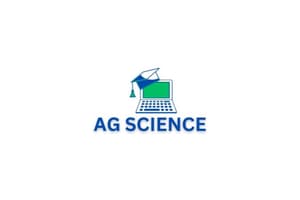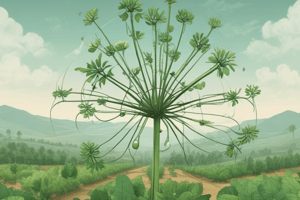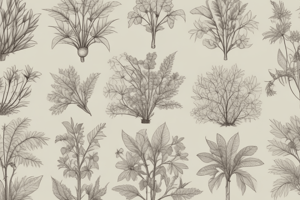Podcast
Questions and Answers
What is the primary reason agriculture is heavily dependent on angiosperms?
What is the primary reason agriculture is heavily dependent on angiosperms?
- They have fibrous root systems
- They produce seeds inside a fruit (correct)
- They have vegetative and reproductive structures
- They are the only type of plant that can undergo vegetative propagation
What is the main function of vegetative structures in flowering plants?
What is the main function of vegetative structures in flowering plants?
- To produce seeds inside a fruit
- To produce new plants with characteristics of the parent
- To undergo vegetative propagation
- To increase the size, height, and mass of the plant (correct)
What is a characteristic of monocotyledon leaves?
What is a characteristic of monocotyledon leaves?
- They have a network of veins
- They have fibrous root systems
- They are typically found in palm trees
- They are narrow with parallel veins (correct)
What is the term for the process by which vegetative parts of a plant can be used to produce new plants?
What is the term for the process by which vegetative parts of a plant can be used to produce new plants?
What is a characteristic of dicotyledon flowers?
What is a characteristic of dicotyledon flowers?
What is the primary function of reproductive structures in flowering plants?
What is the primary function of reproductive structures in flowering plants?
Flashcards are hidden until you start studying
Study Notes
Plant Structure & Function
- Majority of plants are angiosperms, also known as flowering plants.
- Angiosperms produce seeds enclosed within fruits, essential for reproduction.
- Agriculture primarily relies on angiosperms for crop production, crucial for food sources for humans and animals.
Plant Parts
- Plants have two main types of structures: vegetative and reproductive.
- Vegetative Structures: Includes leaves, stems, and branches; responsible for growth in size, height, and mass.
- Reproductive Structures: Include flowers, fruits, and seeds; crucial for producing offspring with traits inherited from parent plants.
Reproduction Methods
- Vegetative propagation (asexual reproduction) occurs when vegetative parts (stem, leaf, root) are used to produce new plants.
- This method enables some plants to reproduce without seeds.
Plant Classification
-
Monocotyledons:
- Examples: palm trees, grass, sugarcane.
- Characteristics include narrow leaves with parallel veins and a fibrous root system.
-
Dicotyledons:
- Examples: trees and shrubs.
- Characteristics include wider leaves with a network of veins and a tap root system.
- Flower petals are generally in groups of four or five.
Studying That Suits You
Use AI to generate personalized quizzes and flashcards to suit your learning preferences.




